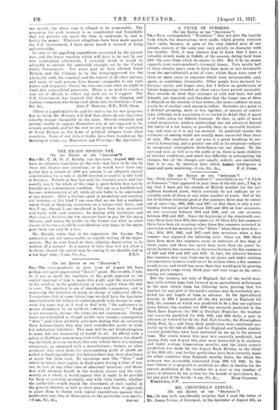THE EXCESS PROFITS TAX.
fTo SUE EDITOR Or TEE SPECTATOR..]
Bra,—Mr. C. H. St. J. Hornby (see Spectator, August 4th) can have no adequate experience of the risks that have to be run by those who finance slew inventions, or be would never hare sag- voted that a return of .0480 per annual is an adequate annual remuneration for a sum of .25,000 invested as capital in this kind of business. Patents at best last only for fourteen years, and fre- quently nearly the whole of this time is spent before they can be brought to a remunerative condition. Not one in a hundred ever becomes remunerative at all, while all are liable to be superseded at any minute. After a lifetime spent in promoting and currying cut ventures of this kind I am sure that no one but a madman would think of financing inventions on a ten-par-cent. basis, and this I say, though I am considered to have been very successful and lucky with such ventures. In dealing with inventions and that class of business the few successes have to pay for the many failures, and unless the profits on the former are what in other classes of business would be considered as very large, in the aggre- gate there can only be a loss.
Mr. Hornby states that in his experience the Income Tax authorities are not unreasonable as regards writing off for depre- eiation. Has he ever beard of their allowing depreciation to be written off It patent? As a matter of fact, they will not allow a farthing, though the patent ninny be coming to an absolute end in


























 Previous page
Previous page